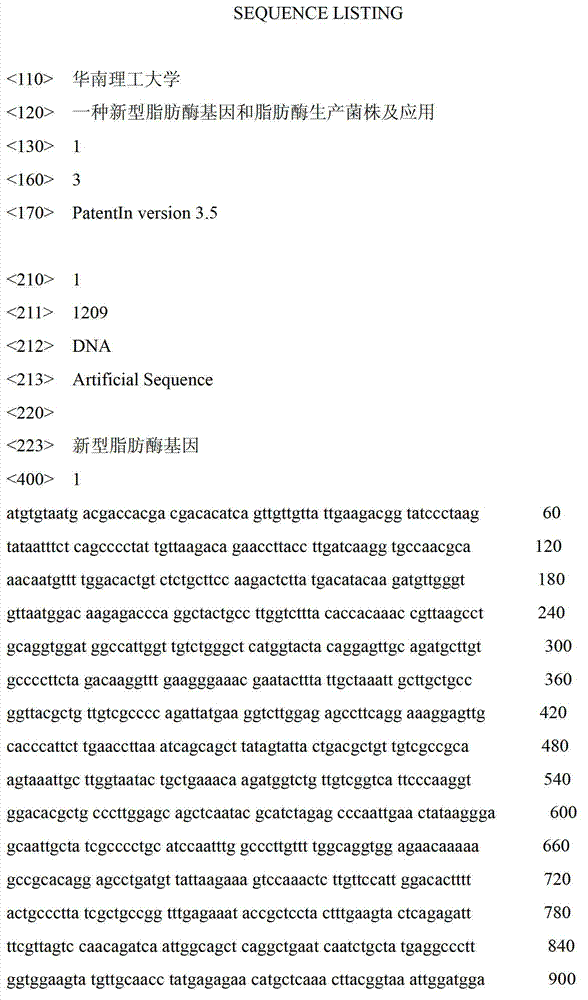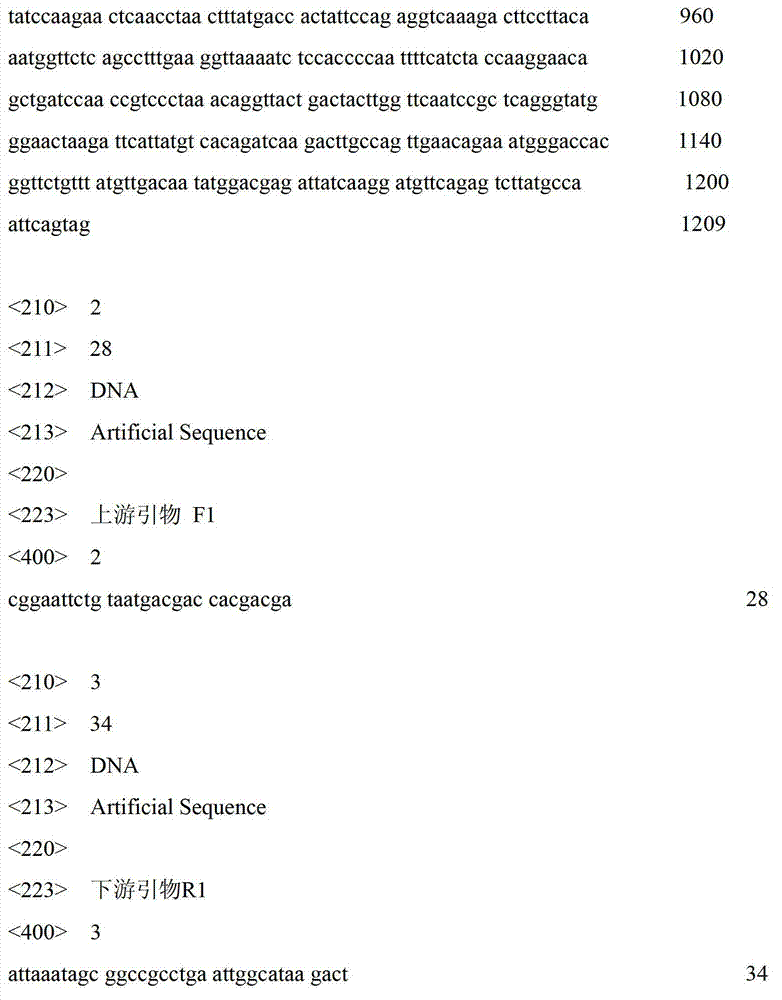Novel lipase gene, lipase production strain and application
A kind of lipase gene and lipase technology, applied in Pichia pastoris strains, the application field of waste newsprint deinking, can solve the problems of limited development, low expression of original strains, not seen, etc.
- Summary
- Abstract
- Description
- Claims
- Application Information
AI Technical Summary
Problems solved by technology
Method used
Image
Examples
Embodiment 1
[0022] The synthesis of embodiment 1 novel lipase gene
[0023] Based on the Achetobacter radioresistens CMC-1lipase (GenBank: AF073953.1) gene sequence published on the National Center for Biotechnology Information (NCBI, http: / / www.ncbi.nlm.nih.gov / ), the sequence was optimized , replaced with the codon preferred by Pichia pastoris to obtain a new lipase gene, its sequence is shown in SEQ ID NO.1, and then the new lipase gene was cloned through the whole gene synthesis of a biotechnology company (GenScript Biotechnology Co., Ltd.) To the pUC57 plasmid to obtain the plasmid pUC57-ARL.
Embodiment 2
[0024] Example 2 Construction of plasmid pPICZαA-ARL containing novel lipase gene and strain Escherichia coli TOP10 / pPICZαA-ARL carrying novel lipase gene
[0025] (1) Design primers for amplifying the gene according to the sequence of the novel lipase gene:
[0026] Upstream primer F1: 5'-CG GAATTC TGTAATGACGACCACGACGA-3', containing EcoRI restriction site (shown underlined) and protective base;
[0027] Downstream primer R1: 5'-ATTAAATA GCGGCCGC CTGAATTGGCATAAGACT-3', containing the NotI restriction site (shown underlined) and the protection base.
[0028] (2) Perform PCR amplification using the plasmid pUC57-ARL in Example 1 as a template and F1 and R1 as primers; PCR amplification procedure: pre-denaturation at 94°C for 2 minutes; denaturation at 94°C for 30s, annealing at 55°C for 30s, extension at 68°C 90s, a total of 30 cycles; the 30th cycle was extended at 68°C for 7 minutes.
[0029] (3) The PCR product and plasmid pPICZαA (purchased from Invitrogen) were digest...
Embodiment 3
[0032] Example 3 Construction of Lipase Production Strain Pichia Pastoris X33 / pPICZαA-ARL
[0033]The linearized pPICZαA-ARL (digested with SacⅠ enzyme) plasmid in Example 2 was transformed into Pichia pastoris X33 (purchased from Invitrogen) by lithium chloride (LiCl) method, and Zeocin (bleomycin) at 0.1-2 mg / mL ) resistance YPD plate for screening. The genomic DNA of the screened transformants was used as a template, and the upstream primer F1 and downstream primer R1 were used as primers for PCR identification. The correct transformant identified by PCR was the lipase producing strain Pichia Pastoris X33 / pPICZαA-ARL.
PUM
| Property | Measurement | Unit |
|---|---|---|
| Tear | aaaaa | aaaaa |
Abstract
Description
Claims
Application Information
 Login to View More
Login to View More - R&D
- Intellectual Property
- Life Sciences
- Materials
- Tech Scout
- Unparalleled Data Quality
- Higher Quality Content
- 60% Fewer Hallucinations
Browse by: Latest US Patents, China's latest patents, Technical Efficacy Thesaurus, Application Domain, Technology Topic, Popular Technical Reports.
© 2025 PatSnap. All rights reserved.Legal|Privacy policy|Modern Slavery Act Transparency Statement|Sitemap|About US| Contact US: help@patsnap.com


